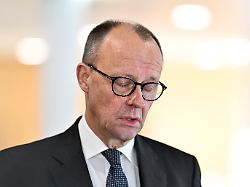Danger to democracy?
Merz shoots against Esken in the AfD ban debate
January 4, 2024, 5:23 p.m
Listen to article
This audio version was artificially generated. More info | Send feedback
Many politicians in Germany are currently discussing a ban on the AfD. SPD leader Esken is in favor of this. CDU leader Merz is not enthusiastic about the idea and sharply criticizes the Social Democrat. She doesn’t just get support from her party.
Despite high legal hurdles for banning the AfD, the debate about it is gaining momentum. Politicians from the SPD, the Left and the Greens advocate keeping the option open – even if the AfD has to be countered politically. CDU leader Friedrich Merz, however, strictly rejected a ban.
He told the “Münchener Merkur”: “Such sham debates are grist for the AfD’s mill.” He particularly criticized SPD leader Saskia Esken: “Does the SPD leader seriously believe that a party that gets close to 30 percent in surveys can simply be banned? That is a frightening suppression of reality.” Only sensible political solutions to problems are effective, then the AfD will become smaller again.
A few days earlier, Esken said, “Such a party ban is rightly subject to high hurdles. But I am convinced that we should keep checking this.” Accordingly, it is important “that a ban on the AfD is talked about and that voters are also roused.” To justify this, Esken said that the AfD was part of a right-wing extremist network, kept lists of unwelcome critical journalists and set up reporting portals for teachers who were critical of the AfD. “She uses every topic to incite people. For me, that is clearly anti-democratic,” she emphasized.
Thierse: AfD will style itself as a victim
The Alternative for Germany, founded in 2013, is listed nationwide by the Office for the Protection of the Constitution as a suspected right-wing extremist case. In Thuringia, Saxony-Anhalt and Saxony, the state Office for the Protection of the Constitution sees the AfD state associations as definitely right-wing extremist. That’s why “the state has an obligation to consider banning the AfD,” said former Bundestag President Wolfgang Thierse to the “Tagesspiegel”, thereby siding with Esken. “But you have to think about it very soberly: there are high hurdles to banning a party in Germany, a ban process takes a long time, probably many years, and the AfD would exploit this significantly in propaganda and style itself as a victim.”
The Saxon SPD’s top candidate for the state elections, Petra Köpping, also spoke out in favor of regularly examining the chances of an AfD ban. The NPD ban process failed because the party only achieved poor election results and therefore posed no danger. As a reminder: The Federal Constitutional Court ruled against a ban on the NPD in 2017. The judges saw the party’s efforts against the free-democratic basic order, but there was no evidence that the small party could be successful with this. “I see things differently with the AfD,” argued Köpping in the “Spiegel”. “The AfD is strong, it is a danger to democracy.”
Weigh arguments carefully
The Green Party politician Konstantin von Notz called for a political debate in order to “take away the breeding ground” for the AfD. But he pointed out: “The AfD is a party that deeply despises our democracy.” A party ban is a possible instrument in Germany, although the hurdles are high. The constitutional bodies must keep an eye on assessments by the security authorities and “carefully weigh up the arguments for and against a ban.”
Left leader Martin Schirdewan said: “The option of banning a party must not be dismissed too quickly. And unlike the NPD, the AfD could unfortunately no longer avoid a ban by becoming irrelevant.” But he also added: “You shouldn’t think that your homework will be done if you ban a fascist party. The focus should first be on your own political work.”
In polls for the federal election, the AfD is in second place behind the CDU/CSU with more than 20 percent – and well ahead of the governing parties SPD, Greens and FDP. In Saxony, Thuringia and Brandenburg, where new state parliaments will be elected in September, surveys show the AfD at the top by a clear margin and over 30 percent.
